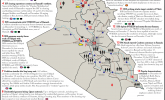 |
 |
Iraq Situation Report: December 15-21, 2015
ISIS launched spoiling attacks across Iraq to relieve pressure by anti-ISIS forces on multiple fronts. ISIS’s attacks follow operations by the Coalition and ISF and Iraq and the Coalition-backed National Democratic Forces in Syria to constrain ISIS on both fronts. In a recent press conference, Operation Inherent Resolve spokesperson Col. Steve Warren cited ongoing anti-ISIS operations in Baiji, Makhoul, and Sinjar in northern Iraq as well as Hit and Ramadi in western Iraq, combined with operations in Shaddadi and Deir ez-Zour in southern Syria. ISIS responded with attacks involving a significant offensive east of Mosul, which was reportedly the largest ground attack since ISIS recaptured Ramadi in May 2015. ISIS also attempted to set back ISF efforts to prepare an assault on Ramadi. ISIS additionally attempted diversionary and probing attacks near Tikrit, Samarra and Fallujah, in order to forestall any upcoming anti-ISIS operations elsewhere in Iraq and force anti-ISIS forces shift resources to re-secure targeted areas ISIS remains on the defensive but maintains attack capabilities across northern and western Iraq. Meanwhile, heavy pressure on PM Abadi from pro-Iranian elements forced PM Abadi to reject Coalition support for the Ramadi operation. However, the Operation Inherent Resolve spokesperson stated that PM Abadi approved of a small U.S. SOF force to cut ISIS’s supply lines between Iraq and Syria. PM Abadi’s ability to accept increased Coalition support suffered further when a Coalition airstrike accidentally hit an Iraqi Army unit near Fallujah on December 18, causing an uproar among pro-Iranian and Iranian proxy actors.
